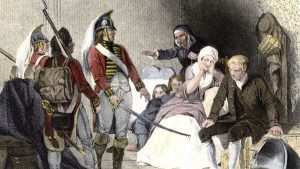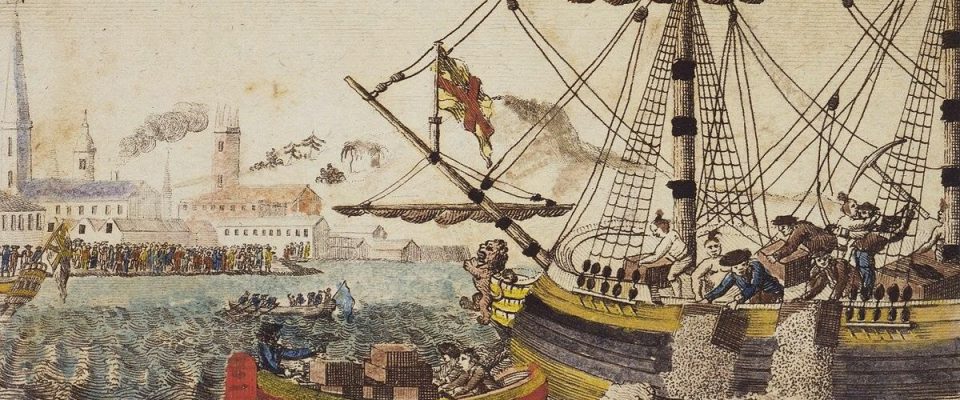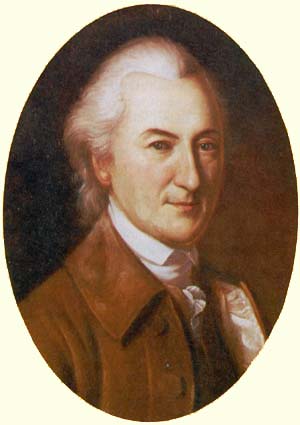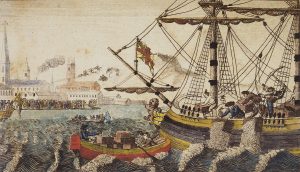By Nancy Spannaus
The March 10 lecture sponsored by the Lovettsville Historical Society focused on the American Revolution once again, with a presentation by well-known military historian Glenn F. Williams[1] on the causes of the Revolutionary War.
Williams’ talk was provocatively entitled “For Britannia’s Glory and Wealth.” He explained that, while his work has focused on 18th century military history, he found it essential to provide the context for the war in the political realm. What he learned upended some of the prevalent myths about the colonies’ struggle with Britain.
A case in point is Williams’ title. It is an excerpt from a song which was composed after the colonists’ successful resistance to the Stamp Tax, and during the escalating fight against the subsequent tax measures imposed by the British government. It doesn’t sound very “revolutionary,” does it? William asked. That realization led him to dig deeper.
Americans supported the British Constitution

It is a common myth that the British realm did not have a constitution. While it’s true that their constitution was not written, Britons and British-American colonists of the time would have taken issue with that statement. They viewed their Constitution as the mixed powers of the monarchy (king), aristocracy (house of lords), and democracy (the Parliament). Under that system, the power to initiate revenue bills lay with the Parliament, which allegedly represented the people. This procedure represented, in their minds, popular consent to taxes being levied. [A balance of these three elements of society was supposed to ensure “liberty” and the “good of the whole community.”[2] –nbs]
Additional elements of the Constitutional arrangements were the right to a jury trial of one’s peers, and freedom from a standing army during peacetime.
All of these elements were paralleled in the structure of the British-American colonies, all which viewed themselves as countries. Ten were royal colonies by the time of the American Revolutionary War. And it was the violation of what the American colonists viewed as these “rights of Englishmen” that served as a rallying cry in the early days of the Revolution.
Making the Case in Song
In discussing this background, Williams turned to the popular “Liberty Song,” whose words were written in 1767 by Pennsylvanian John Dickinson, one of the early leaders of the resistance against the British policies after the Seven Years’ War. It’s from this song that Williams culled the phrase “For Britannia’s Glory and Wealth.”
Williams quoted two elements of Dickinson’s song text, which I have included here. Ironically, the tune was used for the theme song of the British Royal Navy.
Come join band in hand, brave Americans all,
And rouse your bold hearts at fair Liberty’s call;
No tyrannous acts, shall suppress your just claim,
Or stain with dishonor America’s name.In freedom we’re born, and in freedom we’ll live;
Our purses are ready,
Steady, Friends, steady,Not as slaves, but as freemen our money we’ll give. …
This bumper I crown for our sovereign’s health,
And this for Britannia’s glory and wealth;
That wealth, and that glory immortal may be,
If she is but just, and we are but free.
In freedom we’re born, &c.
Dickinson makes Williams’ point: the colonists were totally committed to their mother country. But, as the words that follow each of the bold-faced phrases indicate, that loyalty was contingent upon the British government being “just,” and the colonists being treated as “freemen,” not slaves. In the words of the colonists at the time, adhering to the unwritten British Constitution.
Taxation was not the issue
Which raises the second major myth that Williams vehemently debunked throughout: the idea that the American revolt occurred because the colonists didn’t want to pay taxes. That, he emphasized, was not true at all.
The American colonial legislatures, he explained, acted like little parliaments for the colonies, and they were the source of taxation. Taxes were a part of life in the Americas, and the colonists were used to paying them. Taxation itself was not the issue.
What was the issue, Williams asserted, was the imposition of taxes by the distant Parliament, in which the colonists had no voice, as well as the purposes for which the taxes were levied. Contrary to the standard explanation, the Stamp Act, for example, was not to raise revenue to pay for the debts Britain incurred in the Seven Years’ War; it was to pay for the stationing of thousands of British troops in the colonies. In other words, the colonists were to pay for maintaining a standing army!
The Stamp Act triggered such broad, determined, and sometimes violent resistance that it was repealed within a year. The colonists literally brought trade to a standstill for some time, and the British Parliament was forced to relent. However, Parliament immediately passed the Declaratory Act, which asserted the right to impose any taxes they pleased.
The next set of taxes, called the Townshend Acts, purported to get around the colonists’ objections by being framed as import duties (on items such as glass, paint, lead, paper, and tea), which the colonists had been used to paying for years. However, the purpose of these taxes went smack against a core tenet of the British Constitution as the colonists understood it: it was to pay for the British administration of the colonies. No longer would the colonial governors, and other officials, be paid by the local legislatures, but those officials would be solely dependent on the British government. The colonists would lose the “power of the purse,” the right to be taxed only with their consent (by their legislatures).
Resistance to the Townshend Acts was less effective, Williams said, but it was effective enough to lead to the repeal of all the taxes except that on tea. But the colonists’ leaders were not fooled. The purpose of the tax on tea, small as it was, was still to provide the revenue for the British administration of the colonies, taking away a crucial element of self-government.[3] The British Constitution was being violated.
The result was the Boston Tea Party (Dec. 16, 1773), followed by the Coercive Acts (March 31, 1774) that
- shut down the port of Boston;
- installed a military government that suppressed the local town meetings;
- mandated that trials of American colonists in conflict with British officials, be held in either Nova Scotia admiralty court, or England; and
- granted a huge swath of land beyond the Appalachian Mountains to the then British-colony of Quebec.
All these measures provided sufficient outrage to lead to the first Continental Congress.
While that Congress, and the Second as well, continued to call for a “redress of grievances” – i.e., the restoration of the rights under the English Constitution as they understood it – the road to armed revolt lay straight ahead. Each colony began to establish independent militia companies, and create de facto shadow governments, which received the taxes citizens continued to pay, rather than the royal governments.
The War was not the Revolution
Williams concluded his presentation with a quote from Founding Father Benjamin Rush, a signer of the Declaration of Independence. In an “Address to the American People” in 1787, Rush wrote: “There is nothing more common than to confound the terms of the American revolution with those of the late American war.” It is critical to understand this point, Williams said, as so many Americans today confuse the two.
[1] Glenn F. Williams Ph.D. is a retired Army officer who made public history a second career. He is currently a Senior Historian at the U.S. Army Center of Military History, Fort McNair, DC. His recent books include Year of the Hangman: George Washington’s Campaign against the Iroquois, and Dunmore’s War: The Last Conflict of America’s Colonial Era
[2] See Bailyn, Bernard, The Ideological Origins of the American Revolution, Belknap Press of Harvard, 1992, chapter III.
[3] In addition, the colonists saw the tea tax as a “foot in the door,” since it could be raised at any time.




